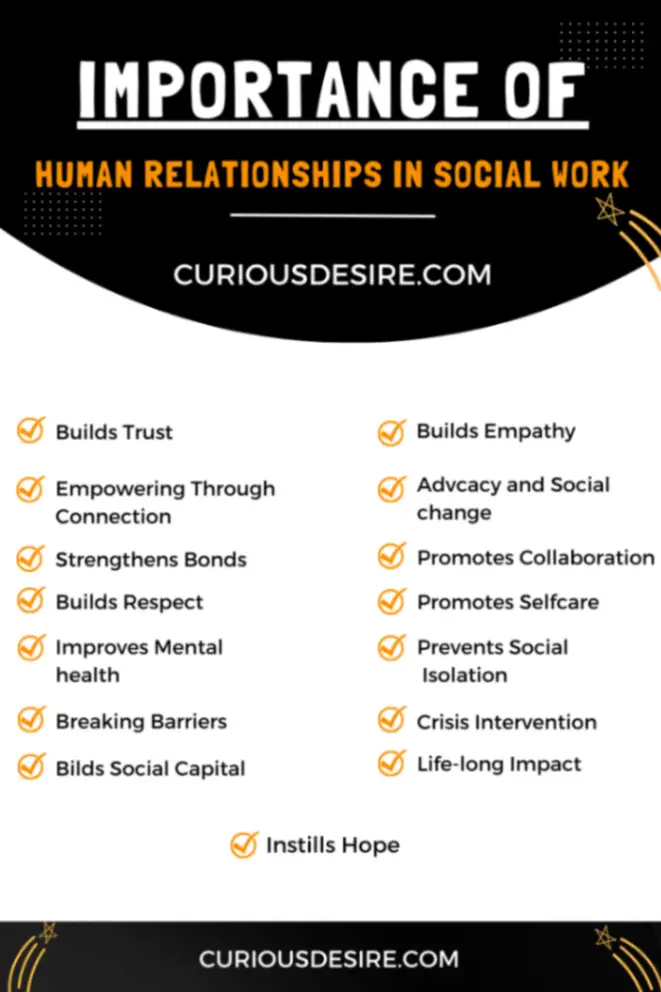Social work, at its core, is about people. It’s about understanding, empathizing, and connecting.
From building trust and rapport with clients to collaborating with colleagues and coordinating with community resources, the importance of interpersonal connections in social work is undeniable.
As you engage with clients from diverse backgrounds and with varying needs, you must navigate the complexities of human relationships with sensitivity and skill.
This blog delves into the importance of human relationships in social work, exploring how these connections contribute to positive outcomes and enhance the overall effectiveness of social work practice.
Here are the 5 most common reasons for the importance of human relationships in social work:
- Support and Empowerment
- Trust and Collaboration
- Advocacy and Social Change
- Self-Care and Resilience
- Crisis Intervention

1. Fosters Trust and Empowerment
Trust is the bridge that connects social workers, and it’s built through genuine, empathetic relationships.
By establishing trust, you can create a safe and supportive environment where people feel empowered to address their concerns and work towards positive outcomes.
This foundation of trust is pivotal in facilitating effective communication, understanding clients’ unique circumstances, and collaboratively formulating intervention plans that resonate with their needs and aspirations.
Without trust, even the most well-intentioned interventions can falter.
2. Empathy and Nonjudgmental Attitude
In social work, empathy serves as a bridge that connects people facing adversity with the support they require.
Through empathy and a non-judgmental attitude, you can create spaces where clients feel validated and understood.
Empathy bridges the gap between different worlds, bringing to light the shared humanity that binds us all.
3. Collaborative Partnerships
The collaborative nature of social work extends beyond client interactions to encompass partnerships with other professionals, organizations, and community resources.
By working in concert with educators, healthcare providers, legal advocates, and community leaders, you can harness a wide array of resources to effect meaningful change and enhance the well-being of your clients and communities.

4. Empowering Through Connection
Human relationships in social work have the power to empower people and communities, providing them with the support and encouragement needed to navigate life’s complexities.
By fostering a sense of connection and belonging, you can help clients build resilience, self-efficacy, and a sense of agency in their lives.
Through empathetic listening, validation of experiences, and collaborative goal-setting, you can empower clients to make positive changes, overcome obstacles, and achieve their full potential.
5. Enhances Cultural Competence
Cultural competence is a cornerstone of effective social work practice, and human relationships play a crucial role in promoting understanding and respect for diverse cultural backgrounds.
By developing authentic connections with clients from different cultural, ethnic, and social backgrounds, you can gain insights into their unique perspectives, values, and experiences.
6. Advocacy and Social Change
By forming alliances with clients, community members, and stakeholders, you can amplify the voices of marginalized populations, challenge systemic injustices, and advocate for policies that promote social justice and equity.
These relationships serve as a catalyst for collective action, mobilizing individuals and communities to address structural barriers, promote social inclusion, and create lasting change in society.
7. Self-Care and Resilience
In the demanding and emotionally challenging field of social work, human relationships also play a vital role in supporting the well-being and resilience of practitioners themselves.
Human relationships in social work serve as catalysts for promoting self-efficacy and resilience among clients.
By cultivating supportive relationships with colleagues, supervisors, and mentors, you can access the emotional support, guidance, and validation needed to navigate the complexities of their work.
These connections help prevent burnout, enhance self-care practices, and promote a culture of compassion and solidarity within the social work profession.
8. Improves Mental Health and Well-being
The supportive nature of a positive social worker-client relationship can significantly contribute to your mental health and overall well-being.
This support can validate your feelings and experiences, offering a source of comfort, understanding, and hope during difficult times.
9. Prevents Social Isolation
Human relationships act as anchors that prevent you from falling through the cracks, offering companionship, advocacy, and a sense of belonging that is instrumental in promoting mental and emotional well-being
Through the establishment of meaningful connections and support networks, you can help clients access vital resources, engage with their communities, and combat feelings of loneliness and alienation.
10. Breaking Barriers
Human relationships can help break down barriers that you may face, whether they are social, economic, or emotional.
By forging connections, you can help clients navigate these barriers and work towards positive change
11. Crisis Intervention
In crises, the presence of a trusted social relationship can make a significant difference.
The established relationship ensures a quicker, more effective response, as you are already familiar with the individual’s history, needs, and preferences and can provide immediate and appropriate support.
12. Builds Social Capital
Social capital refers to the networks of relationships among people who live and work in a particular society.
These networks can provide support, information, and increased opportunities for those who might otherwise be marginalized.
13. Fosters Independence and Empowerment
Empowerment is a key goal in social work, aiming to enable individuals to take control of their lives and decisions.
Through supportive relationships, you can help build the confidence and skills your clients need to navigate life’s challenges independently.
Human relationships empower you to take control of your life and make positive changes.
14. Lifelong Impact
The influence of a positive relationship with a social worker can extend far beyond the immediate context of the services provided.
The insights, coping strategies, and sense of empowerment gained through this relationship can have a lasting impact on your life path, demonstrating the enduring value of human connections in social work.
15. Inspiring Hope
Above all, human relationships in social work provide you with hope.
Whether it’s through a kind word, a supportive presence, or unwavering advocacy, you can inspire hope and optimism in the lives of those you serve.
This hope can be a powerful force in driving you towards positive change and a brighter future.
Tips to Improve Human Relationships in Social Work
Improving human relationships in social work is akin to nurturing a garden. It requires patience, understanding, and a bit of creativity. Here are effective tips on how to nurture this:
1. Active Listening
Actively listen to clients, colleagues, and community members.
This involves giving your full attention, maintaining eye contact, and providing verbal and non-verbal cues to show that you are engaged and interested in what they are saying
Give your full attention, acknowledge your feelings, and respond appropriately. This shows respect and value for the person’s experiences and perspective
2. Respect
Treat everyone with respect, regardless of their background, beliefs, or circumstances.
Show respect through your words, actions, and body language. When people feel respected, they are more likely to open up and engage in meaningful conversations.

3. Establish Boundaries
Healthy boundaries are the fence that protects the garden
Set clear and appropriate boundaries with clients and colleagues to maintain a professional relationship. It’s important to create a balance between being supportive and maintaining professional distance to ensure ethical and effective interactions.
4. Practice Patience
Growth doesn’t happen overnight.
Be patient with the process and with those you are helping. Recognize that change is often slow and nonlinear.
Practice patience and understanding, especially when working with people who may be facing challenges or difficult circumstances.
5. Flexibility
Be flexible and adaptable in your approach to working with individuals and communities.
Recognize that everyone’s needs and circumstances are different, and be willing to adjust your strategies and interventions to best meet those needs.
6. Nurture Self-Care
You can’t pour from an empty cup.
Regularly engage in self-care practices to replenish your energy and maintain your well-being. A well-rested, balanced social worker is better equipped to build strong, meaningful relationships.
7. Empathy
Show empathy towards the people you’re working with.
This means putting yourself in their shoes, understanding their emotions, and demonstrating that you truly care about their well-being. Empathy fosters a sense of connection and can help in building trust and rapport
Conclusion
Human relationships are the cornerstone of effective social work practice, providing the foundation upon which meaningful interventions, empowerment, and advocacy efforts are built.
By prioritizing the development of authentic connections with clients, communities, and stakeholders, you can create a ripple effect of positive change and transformation in the lives of those you serve.
Let us never forget that at the heart of social work lies the simple yet profound power of human connection. It is through these relationships that healing begins, growth is nurtured, and change is made possible
Importance of Human Relationships in Social Work: FAQs
1. Why are human relationships important in social work?
Human relationships are important in social work because they form the foundation of effective intervention and support for individuals, families, and communities in need. By building positive, trusting connections with clients, social workers can better understand their unique circumstances and provide tailored assistance.
2. How do human relationships contribute to successful social work practice?
Strong human relationships facilitate open communication, mutual trust, and collaboration between social workers and their clients. This, in turn, enhances the effectiveness of social work interventions and promotes positive outcomes in addressing social issues and individual needs.
3. Do human relationships play a role in advocating for clients’ rights and needs?
Absolutely. Human relationships can empower social workers to advocate effectively for clients’ rights and needs by amplifying clients’ voices and experiences. Strong relationships with clients can inform and strengthen social workers’ advocacy efforts, leading to meaningful change and improved outcomes for those they serve.
4. What impact do human relationships have on the prevention of social issues and problems?
Positive human relationships can support individuals and communities in preventing social issues and problems by fostering a sense of connectedness, support, and resilience. Through these relationships, social workers can promote proactive strategies and initiatives that strengthen individuals and communities, ultimately mitigating potential social issues.
5. What role do human relationships play in the long-term outcomes and sustained well-being of clients?
Human relationships can significantly influence the long-term outcomes and sustained well-being of clients by providing ongoing support, connection, and accountability. A strong, enduring relationship can serve as a source of resilience, stability, and empowerment for clients as they navigate various life challenges